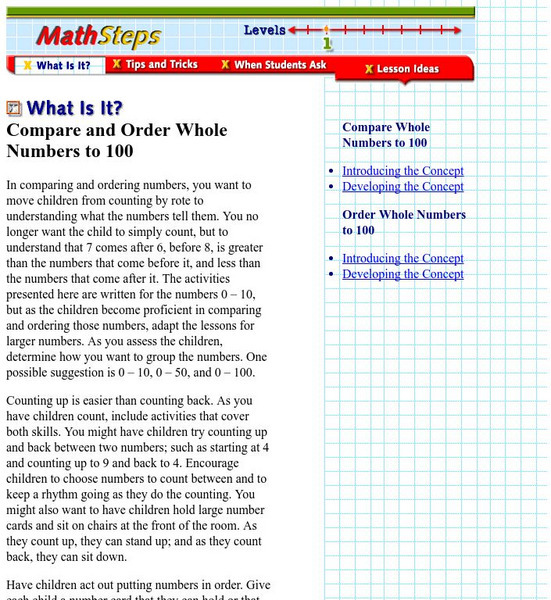Hi, what do you want to do?
Curated OER
ADULT ESOL LESSON PLAN--Concepts of Time and Money
Students identify different denominations of United States currency and symbols associated with money and reading prices. In addition, in pairs they identify examples of currency from newspapers and magazines.
Curated OER
Regrouping
Students practice regrouping using the wonderful manipulative - unifix cubes. Once they have a tactile understanding of regrouping, students complete 5 worksheets containing addition problems that require regrouping. The worksheets...
Curated OER
Super Cents
Second graders study money amounts less than a dollar. In this math activity, 2nd graders practice counting coins. Students read various stories and discuss how money was used in the stories.
Curated OER
A Statistical Look at Jewish History
Young scholars complete their examination over the Jewish Diaspora. Using population figures, they discover the importance of percentages in exploring trends. They use their own ethnic group and determine how it is represented in the...
Curated OER
Fraction Conversion Lesson Plan
Students practice converting fractions into decimals and percents using a computer applet and the concept of money.
Curated OER
Counting Seeds
Students practice skip counting strategies, estimation, and higher number addition. They estimate the number of seeds in bell pepper, and count seeds in groups of tens and ones after the teacher removes seeds from the pepper.
Curated OER
Team Apollo
Seventh graders brainstorm about problems with a school track. They research different possibilities for a solution. They test different track materials with erosion, durability, abrasiveness and resiliency. They determine the area,...
Curated OER
Science: Changes in Matter
Second graders discover what changes occur in various types of matter under different conditions. They make predictions about the changes in an apple left out in the air, water placed in a freezer, and a nail left in a cup of water. They...
Curated OER
Food Labels
Students study nutrition and the facts about food labels. In this investigative lesson plan students examine food labels and the health facts and serving sizes.
Curated OER
Barge Building: What Floats Your Boat?
Students construct aluminum foil boats that float while holding the greatest number of pennies. They investigate the concept of water displacement, record their results, and watch a Bill Nye video on buoyancy.
Curated OER
Hands On Math Lessons with Technology
Students explore a variety of math concepts. In this integrating technology lesson, students visit online webtools such as Max's Math Adventure, I Know That Math, Hands on Banking, and more. A description of each website is provided.
Curated OER
Fractions, Decimal, Percent Relationships.
Young scholars solve problems involving fractions, decimals and percents. In this algebra lesson, students examine the relationship between fractions and percents and between decimals and percents. They convert between percents, decimals...
Pennsylvania Department of Education
Adding Common Fractions
Fourth graders estimate various measurements. In this activity on measurement, 4th graders estimate the length and mass of multiple objects. Students discuss the difference between a guess and a reasonable estimate and discuss using...
Curated OER
Liquid Killer
Students explore number sense applications and discuss strategies for multiplication and division using mental math. For cross-curricular purposes, they explore causes and effects of inequality and social injustice. Students explore...
Curated OER
Predators and Prey
Students explain how the food chain works. They contrast predators with prey and describe their function in nature. Students discuss how the food chain aids in keeping nature balanced. In small groups, they play a game that simulates the...
Curated OER
Word Power
Fifth graders identify a set of data from a real world problem. In this statistics lesson, 5th graders identify the range, mode, median and mean using some manipulatives. They write words randomizing the letters.
Curated OER
Make Your Own Thermometer
Young scholars recognize the concept of temperature, including degrees, and the melting and freezing process. In this 1st - 2nd grade lesson plan, students identify the temperature of various objects, as well as create their own paper...
Curated OER
Great Grams
Learners measure objects effectively using standard units, They examine how consistency in the units used allows for easier and more accurate communication of mass measures.
Curated OER
Math in My World
Third graders record in their journals the many ways in which mathematics is part of their world.
Curated OER
Float My Boat
Fourth graders, in groups, experiment with density and the displacement of water by creating and designing their own boats and seeing which boat holds the most centimeter cubes without sinking..
Curated OER
Zebra, Zebra Where Are Your Stripes?
Students observe the embryological development in the zebrafish. Developmental hierarchy from three germ layers is studied in depth. Research is validated on the body plan of the embryo.
Curated OER
Data Analysis, Probability, and Discrete Math: Lesson 6
Eighth graders engage in a lesson that is concerned with the concepts surrounding the interpretation of information included in graphs for analysis of data for probability. They examine circle graphs and differentiate the values of...
Education Place
Houghton Mifflin: Eduplace: Compare and Order Whole Numbers to 100
In order to help children understand what numbers mean, it is helpful to teach them how to compare and order them. This site provides lesson plans, tips & tricks, and frequently asked questions. It's concise and easy to understand.




























